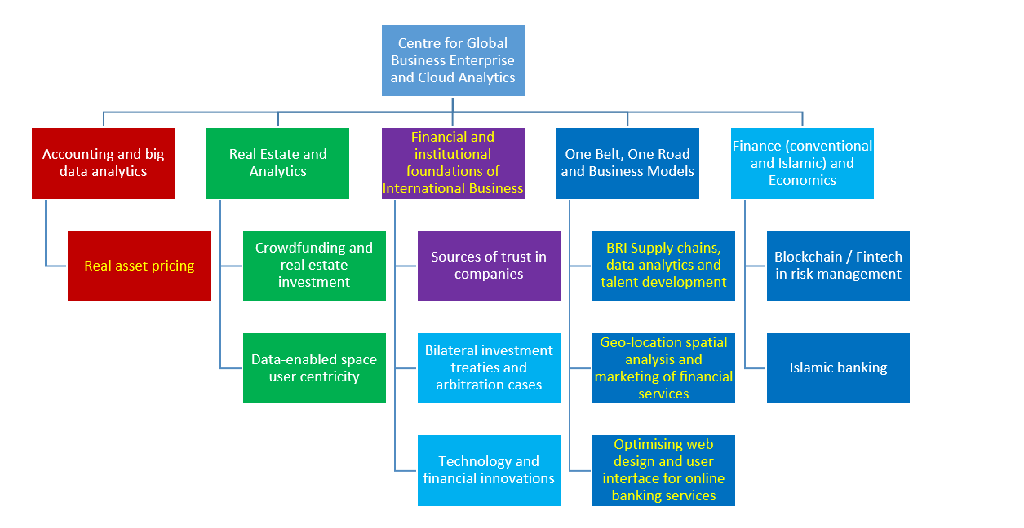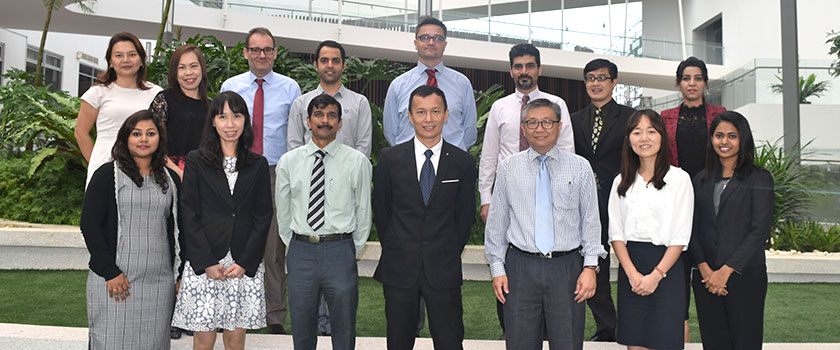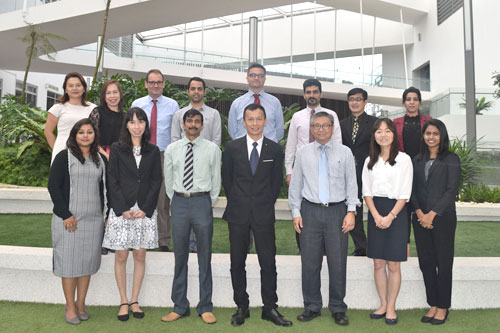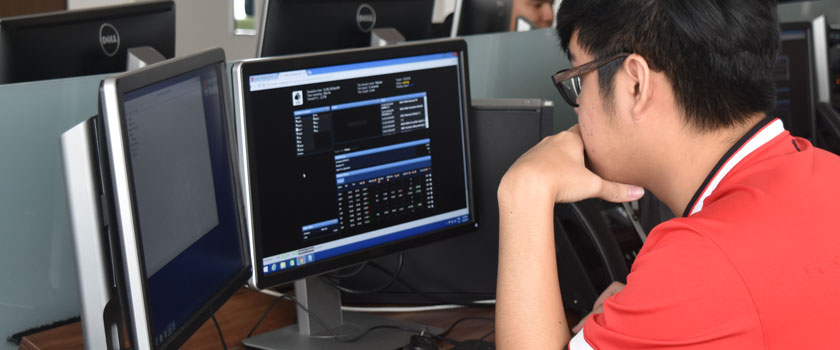VISION
To be a centre of excellence for enabling Digital Inclusion and creating sustainable socio-economic impacts.
MISSION
Developing digital and analytical skills to empower a data driven economy.
The Centre for Global Business Enterprise and Cloud Analytics (CGBECA) strives to simplify and make big data analytics accessible to professionals and industry practitioners.
ABOUT US
We are a group of independent researchers sharing interests in solving non-trivial problems particularly those pertaining to big data in global contexts. The Centre bring together experts and industry partners to share best practice and provide simple solutions by developing innovative models and analytics based on objective research and scientific methods. We work across disciplines and leverage on latest digital technologies.
Our main objective is to be a world leading centre of excellence for research on advancing methods and/or models for addressing societal, environmental and economic challenges. Some of our current projects are:
- One belt, One Road Initiative: our research revolves around three areas under the Belt Road Initiative (BRI). The first is concerned with supply chain models of BRI with regards to new investments in networks of supply chains and their impact on local economies and communities. Second, we examine the role of technology and data analytics in enabling BRI and gaining supply chain efficiencies. Third, we develop human resource (HR) analytics and models to address talent development from the BRI.
- Finance and technology: financial models which optimise capital allocation and/or reduce waste or inefficiencies. We specialise in simplifying complex financial decisions and helping stakeholders to make objective financial decisions in the finance and retail industries. For example, we are working with financial institutions and retailers to integrate new technologies and data analytics in their business model.
- Transportation in the context of supply chain management, the means which allow us to travel from one place to various destinations affect our well-being and standards of living in terms of mobility and access to services especially in the current Covid-19 pandemic. Our mobility especially through land transportation can have major economic, social and environmental implications. We model transportation needs along with scheduling constraints, distribution, availability of resources and environmental impacts. We examine how digital technology enhances green supply chain, customer experience and match capacity with market demands.
We partner with major institutions and industry leaders to develop relevant and innovative business solutions.
MEMBERS
Teck Yong Eng (Director); Sunny Yang and Ioannis Krasonikolakis (Deputy Directors)
Abdolhussein Zameni, Bounmy Inthakesone, Chin Kee Liang, Evelita Estela Celis, Grant Michelson, Ilias Kapareliotis, Janice Lee, Ji Hei Lee, Jireh Seow, Ka Phdy, Keiichi Nakata, Lin-Chih Wu, Manel Guechtouli, Marcus Leibrecht, Maryam Rezaei, Nafis Alam, Patrick Lecomte, Pisal Zainal, Shelen Ho, Tih Sio-Hong, Ting Kien Hwa, Vahid Biglari, Yingying Huang, Wing Lam, Yoke Yue Kan and Zahra Pourabedin
RESEARCH

Figure 1: An overview of the centre research areas and current projects
Research Projects and/or Interests:
Integrating one belt, one road new supply chains
Eng, T.Y. and Yang, S.
The One belt, One road initiative or known as Belt Road Initiative (BRI) by China will transform global supply chain routes and business landscape. This research examines how the development of BRI affect and extend the Chinese supply chains and their implications for different host countries. By modeling the proposed new supply chains from the BRI the study examines potential economic implications. This includes developing an understanding about:
- Supply chain networks of BRI and socio-economic impact for local businesses. This involves modeling of new markets, distribution, and supply and demand for products and services.
- Technology application across supply chain services in terms of data analytics, digitisation and innovation for BRI.
- Human resource implications of BRI especially strategic human resource planning and technology deployment (e.g., artificial intelligence) and talent development to cope with future supply chains and BRI opportunities.
Retail banking: Challenges and evolutions in digital transformation
Krasonikolakis, I. and Eng, T.Y.
Digital banking through the use of websites and mobile applications (e.g., Monzo, Revolut) is changing the way nowadays banks interact with their customers. The use of digital technology in online media (platforms) provides instantaneous solutions to customers and businesses. In a five-year study (2013-2017) conducted for four major US banks with an international presence (Pramanik et al., 2019), the results show the dynamics of the field and the trends of the past that is current practice: (1) the number of mobile payments exceeds 3 billion every week, (2) a new and award-winning digital (mobile) bank platform attracted 5,500 new users daily, increasing eventually the number of users by 22 million, and (3) a bank of 40 million 'digital' customers has reduced transactions compared to the physical stores by 130 million and increased the electronic transactions by 180 million within two years.
Large multinational technology-focused companies have penetrated in the online payments sector, and new companies focusing on the provision of financial services are constantly emerging. FinTech already exert pressure both on the traditional banking sector, as well as on regulatory frameworks. In the USA, the legislative framework encourages the establishment of new banking architectures strengthening the continuous change in the development and provision of financial services (Berger, 2003). FinTech through real-time interaction with the customers can better understand their needs and react accordingly due to the simplification of their processes. FinTech has been "attacking" traditional banks with digital "weapons" by attracting their customers’ base. (CapGemini, 2016). This empirical research investigates a conglomerate of international banks on how new technologies transform the relationships of the Banks with the customers and other entities involved.
Financial technology and innovation
Nafis Alam, Yoke Yue Kan, Pisal Zainal
Research about role of technology in finance, banking and business to assess how financial institutions (FIs) are leveraging technological changes and improving the quality of financial services. This area of research brings together financial industry experts for dialogue and industry collaboration to discuss key issues and identify how to jointly address them. Some of the proposed research areas within the fintech and financial innovation will be:
- Understanding the role of Blockchain/ Fintech in Risk management
- How the combination of several innovations in different areas of financial services, from payments to investment services, will affect the microstructure of financial markets
- What are general perceptions of customers/investors when it comes to role of technology in Finance- Psychological implications
- What are the expectations of FIs from future finance graduates and if Universities are ready to deliver it
- Role of Roboadvisors and automation in Financial industry
- Use of bigdata and analytics in Financial services
Accounting analytics
Celis, E.E, Wu, C. and Chan, D..
Research in accounting and audit industry could leverage data analytics for the future outlook in accounting and assurance practice, such as financial reporting analysis and asset valuation. Streams of research in the interface of operations research and accounting analytics would benefit the industry by bringing collaboration with accounting professionals. Some of the proposed areas of research in accounting analytics include:
- Data analytics (predictive and prescriptive analytics) in shifting roles of accountants
- Application of big data in asset and financial instrument pricing
- How machine learning could be used in audit service
- Accounting information system under cloud computing
Real estate and analytics
Lecomte, P. Lee, J.H., Kee, K.L., and Lee, J.
New technologies are revolutionizing the way urban environment and buildings function and interact. Our research focuses on opportunities to develop knowledge and build context specific content in the fields of property management, real estate development and investment. For many years, real estate has been a spectator of technology, but things are changing fast for this tech-laggard sector as disruption is underway. Property and the built environment are indeed moving at the epicentre of a technology revolution.
Among the topics researchers affiliated to the Centre focus on are:
- Smart buildings and big data, especially in the context of Asean: opportunities for the real estate industry.
- Blockchain and smart contracting of real estate transactions: how can smart technology be applied in Asean countries to build transparent land registries, and keep track of property records, easements and deeds?
- Blockchain and smart contracting of real estate transactions: how can smart technology be applied in Asean countries to build transparent land registries, and keep track of property records, easements and deeds, thereby fostering property rights?
- Property management and smart technologies (e.g., IoTs, data analytics) with a focus on retail properties: maximizing yield for physical properties in the era of e-commerce. What do embedded technologies mean for developers, mall operators and retailers?
- Crowdfunding and real estate investments: this builds on the centre’s pro bono workshop which aims to help its participants identify new entrepreneurial start up opportunities.
- Data-enabled space user centricity in smart buildings, which accounts for space utilisation and productivity as well as space user experiences for a range of property types.
RECENT PUBLICATIONS
Eng, T.Y., Ozdemir, S., Suraksha, G., & Kanungo, R. forthcoming. International social entrepreneurship and social value creation in cause-related marketing through personal relationship and accountability. International Marketing Review DOI (10.1108/IMR-12-2018-0360)
Krasonikolakis, I., Tsarbopoulos, M., & Eng, T.Y. 2020. Are incumbent banks bygones in the face of digital transformation? Journal of General Management, 46(1), 60-69.
Lecomte P. 2020. iSpace: principles for a phenomenology of space user in smart real estate. Journal of Property Investment and Finance, Special Real Estate Innovations and Proptech Issue, 38:4, 271-290.
Ozdemir, S., Gupta, S., Foroudi, P., Wright, L. & Eng, T.Y. 2020. Corporate branding and value creating for initiating and managing relationships in B2B markets. Qualitative Market Research. https://doi/prg/10.1108/QMR-12-2017-0168
Zaefarian, R., Tasavori, M., Eng, T.Y., & Demirbag, M. forthcoming. Development of international market information in emerging economy family SMEs: The role of participative governance. Journal of Small Business Management.
CONFERENCE PROCEEDINGS
Krasonikolakis, I. & Eng, T.Y. 2020. Retail banking: challenges and evolutions in digital transformation. Annual EuroMed Academy of Business conference (EMAB) online 9th and 10th Sept 2020
Lecomte P. American Real Estate and Urban Economists Association (AREUEA) international conference, June 2019, Bocconi University, Milan, Italy.
Lecomte P. European Real Estate Society annual conference, July 2019, ESSEC Business School, Cergy-Pontoise, France.
FUNDED PROJECTS
INSPEN/ NAPREC in cooperation with the University of Malaya: The emergence of virtual space and impact on retail malls in the Klang Valley, Malaysia (Pr. Teck Yong Eng, Project Leader).
International Joint Research Program 2020 project: “An investigation of organizational readiness to foster entrepreneurial university” as Co-PI, in collaboration with School of Business and Management Institute of Technology Bandung Indonesia.
FORTHCOMING EVENTS
| CGBECA | Topic | Venue and date |
| Patrick Lecomte | Beyond 5G | 22nd International Surveyors' Congress, Royal Institution of Surveyors Malaysia- RISM, November 19th, 2020. |
| Patrick Lecomte | Presentation on Smart Building Technology | BOMEX Virtual 2020, the annual conference of the Building Owners and Managers Association (BOMA, Canada)- October 28, 2020. |
DIGITAL CAPABILITY PROGRAMME
In response to positive demands from our ‘Big data Analytics Workshop’, CGBECA is offering new Digital Capability Programme mainly for the Southeast Asia region to train current and future leaders to secure the right digital skills ranging from coding, data analytics to data-driven decision making.
Bespoke and customised big data analytics training
The Centre has a range of expertise in big data analytics. We appreciate that companies prefer to learn and apply specific big data analytics skills to their business and industry context. We are able to tailor and custom build training programme to meet your business needs. For example, we received feedback from participants at our recent summer school on big data analytics that they would like to focus on certain aspects of building their digital capability and big data infrastructure. Our focus is on business solutions through evidence based impacts on return-on-investment and efficiency measurement. Our international team has expertise on setting up business processes and building data analytics skills to take advantage of digitisation, basic data analytics skills and data driven decision making. We have been successful working with major organisations based in the UK and China. We are able to host interested organisations at the University with our state-of-the-art technology especially for training related to coding, data management and statistical programming. We cater to all levels of data analytics skillset from basic to advanced modeling. We are able to work with relevant technology vendors to provide product-related training. The following are examples of dedicated bespoke workshop for your organisation: technology and data driven processes, data collection and management, data analytics techniques, data security, marketing analytics, fintech and business analytics, smart buildings and analytics, coding and statistical programming, and advanced visualisation techniques. Please discuss your business needs and contact us for no obligation consultation,
Data Driven Strategy for senior managers and executives
This is a C-Suite workshop intended for senior managers and executives. A two-day programme aims to give insight into:
- Data analytic decision making – one common misconception about data analytics strategy is that data analysis tasks reside within one function such as market intelligence or information system when data analytic decision making is an organisation wide process. It harnesses computing power and technology to optimize critical business processes through data analytics.
- Data analytic thinking – this requires a strategic mindset with industry experience and knowledge in that data analysis is not restricted to mundane tasks of number crunching. Data analytic thinking is based on fundamentals of data science emphasizing value-added business solutions linked to business strategy.
- Data analytic techniques – senior managers and executives make crucial business decisions but they are often detached from technical knowledge of data analytic techniques. Senior managers with an understanding of basic tools and analytical techniques will be in a better position to advise, develop and implement relevant analytic solutions based on their business requirements.
- Data driven strategy – as data become increasingly important for decision making, IT infrastructure and data are part of an organisation’s corporate strategy. Big data and analytics are considered as strategic assets and investment, where senior managers integrate data driven business processes to business units and strategy especially data driven competitive advantage.
For more information about this senior executive workshop, please email
CGBECA COMMUNITY ENGAGEMENT
CGBECA is looking to work and partner with senior leaders from the private, public and charity sectors in every part of the country – mainly to achieve our goal of widening digital inclusion, participation and making the most of the digital economy. For further information, please email:
CGBECA work with local libraries, not-for-profit think tanks and government agencies to address digital exclusion. For instance, we had offered a Free Business Skills Workshop in Johor Malaysia. In collaboration with local libraries, we will be organising free digital entrepreneurship and digital marketing sessions. We will run targeted coding and computer skills boot camps at remote rural areas in Southeast Asia.
CGBECA Free Business Skills Workshop is targeted for school leavers who have been unemployed or had not been successful in securing employment. This pro bono workshop is intended to help unemployed youths in Malaysia to plan their career and/or learn new business skills. The workshop aims to impart the following knowledge and skills:
- Organization context – this session introduces how an organization relates to its environment and in turn how it influences the environment. It examines how the interface of internal operations and managerial decisions affects business performance and an organization’s environment.
- People and organization – an organization exists because of people in terms of beliefs, attitude, activities, culture and direction. Such interwoven nature of business organization requires leadership and control.
- Strategy – planning and setting objectives are in part influenced by an organization’s strategy and vision. This session examines strategy development and how strategy relates to core competencies.
- Financial literacy – the long-term survival of organization requires managers to understand allocation of financial resources, and account for financial returns and costs. It also relates to the means in which an organization rewards its stakeholders such as employees and shareholders.
- Marketing – it is not about selling or advertising but rather a systematic approach to developing customer relationships and retaining customers. This entails matching customer needs with resources and offerings of the organization.
- Communications – the extent to which an organization influences its stakeholders depends on the ability to communicate effectively. It examines a wide range of communication channels and cues including effective presentation and report writing.
The workshop is divided into the above topics for six separate days and once a month. There are no pre-requisites apart from enthusiasm and desire to succeed. Each session begins with basic concepts and practical implications. The workshop is organized around real-life business activities and/or case studies with hands-on opportunity through practical exercises, application of concepts and simulation of business scenarios.
To find out more, please email
POSTDOCTORAL AND VISITING FELLOW OPPORTUNITIES
We welcome application from recent PhD graduates, young career researchers and established chairs to apply for a visiting position and/or spend time to collaborate with CGBECA Malaysia. Selected scholars will have expertise in relevant digital and data analytics areas that complement CGBECA members. While we are unable to fund your visit and stay, we will provide desk space / office and opportunity to share and exchange knowledge with CGBECA members. Interested applicants please email












